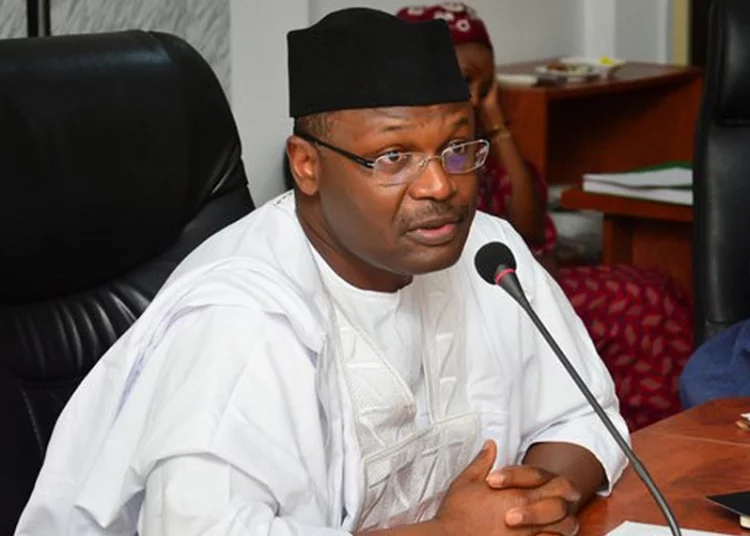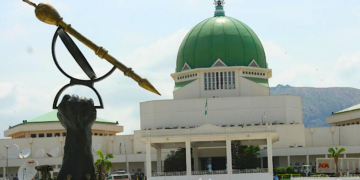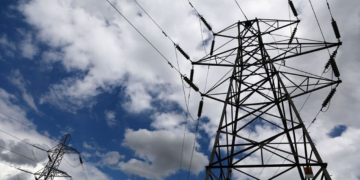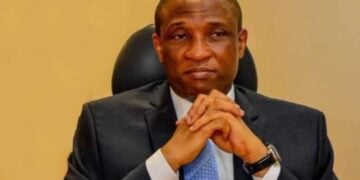Ten governorship candidates in six states and 24 female deputy governorship candidates in 15 states have made it to the ballot to contest the 2023 general election.
But the clamour for election of more women into political offices seems not to have yielded much if the number of female candidates on the ballot so far is anything to go by.
While there is no female presidential candidate, experts, activists and female politicians who spoke exclusively with LEADERSHIP maintained unanimously that the development is a far cry from what was expected, warning that it would impact negatively on growth and development of the country.
Wife of the President, Hajiya Aisha Buhari, had in May this year called on presidential and governorship candidates in the 2023 general election to pick women as their running mates.
The first who was represented by her senior special assistant on Public Affairs and Strategy, Muhammad Zorro, at the LEADERSHIP annual conference and awards ceremony 2021 in Abuja, pointed out that even the Gulf states had started to integrate women in ministerial positions up to 50 per cent.
Noting that the United Arab Emirates reserves 50 per cent slots for women in ministerial appointments and bureaucracy, she said, “In 1983, the great Mallam Aminu Kano picked a woman, Mrs. Bola Ogumbo, who should have been in Delta State today, as his running mate.
“Therefore, it is not asking for too much if aspirants into the offices of Nigerian presidency, governors in the respective states or even chairmen of local governments honour Nigerian women by reserving their deputy positions for women.”
Currently, only four states have female deputy governors in Nigeria. They Cecilia Ezelio (Enugu State), Hadiza Sabuwa Balarabe (Kaduna State), Noimot Salako-Oyedele (Ogun State) and Ipalibo Gogo Banigo (Rivers State).
Since 1999, only six women had been deputy governors. The number of female deputy governors dropped from six in 2015 to four.
In the build up to the 2023 elections, the female presidential aspirants are Khadijah Okunnu-Lamidi of the Social Democratic Party; Uju Ohanenye, first female presidential aspirant under the All Progressives Congress (APC), Carol Nwosu of the African Action Congress (AAC), Ibinabo Joy Dokubo, also of the APC; Patience Key of the People’s Redemption Party; Olivia Diana Teriela of the People’s Democratic Party (PDP), and Angela Johnson of the All Progressives Grand Alliance (APGA).
Unfortunately, none of them were lucky enough to clinch their party tickets.
While there were no women in the 1999 presidential election, two women, Mrs Sarah Jubril of the Progressive Action Congress (PAC) and Major Mojisola Adekunle Obasanjo (rtd) of the Masses Movement of Nigeria (MMN), contested in 2003.
The 2007 and 2011 presidential elections had only one woman each, Major Obasanjo and Ebiti Ndok of the United National Party for Development (UNPD).
In 2015, only Mrs Oluremi Sonaiya was a female presidential standard bearer.
In 2019 there were six female candidates – ACPN candidate, Obiageli Ezekwesili, who later withdrew from the presidential race.
But ahead of the 2023 general election, Northern states have three female governorship candidates, while the South boast of seven.
Aishatu Dahiru Ahmed (Binani) emerged the governorship candidate of APC in Adamawa State, while Nnenna Lancaster-Okoro is the governorship candidate of the Peoples Redemption Party (PRP) and Hon Ngozi Ogbuleke is the governorship candidate of Social Democratic Party (SDP) in Abia State.
Obiang Marikane Stanley is the Action Democratic Party (ADP) governorship candidate in Cross River State.
In Rivers State, there are two female governorship candidates, namely Comrade Beatrice Itubo of Labour Party (LP) and Sophia Cookey of Zenith Labour Party (ZLP).
Niger State also has two female governorship candidates, Tina Barde of Labour Party and Khadijat Abdullahi Iya of APGA.
In Ogun State, the female governorship and their political parties are Chief (Dr) Kasim Jackie-Adunni of NNPP and Iskil-Ogunyomi Sufiat Olajogun Adekemi of AA.
For the running mate position, while the North has six, the South has 18.
In Rivers State, a former commissioner for Education, Prof Ngozi Odu is the deputy governorship candidate of the PDP, while Tonte Dikeh, a Nollywood actress, is the deputy governorship candidate of the African Democratic Congress (ADC).
Similarly, Princess Tambari Hilda Dedam is the deputy governorship candidate of the Accord Party (AP) in Rivers State.
In Lagos State, the PDP governorship candidate In Lagos State, Dr. Olajide Adediran, unveiled Nollywood actress, Funke Akindele as his running mate for the 2023 governorship election in the state.
In Kaduna, the APC governorship candidate in the state, Sen Uba Sani, chose the incumbent deputy governor, Dr. Hadiza Balarabe, as his running mate in the 2023 polls.
In Ogun State, two political parties fielded women as deputy governorship candidates in the forthcoming election.
While the incumbent deputy governor, Engineer Noimot Salako-Oyedele is still paired with her principal, Prince Dapo Abiodun, on the platform of the APC, the Labour Party (LP) has elected Dr Aishat Lawal-Keshinro to pair with its gubernatorial candidate, Kehinde Shogunle, in the election.
In Plateau, the PDP gubernatorial candidate in the state, Caleb Mutfwang, picked Josephine Chundung Piyo as his running mate. Mrs Emana Ambrose Amahwe is the running mate to Cross River State PDP governorship candidate, Senator Prof Sandy Ojang Onor.
Also, the governorship candidate of PRP, Usani Usani, who was former Niger Delta Affairs Minister, picked Mrs Arit Bassey Nsan as his running mate.
In Ebonyi, Mrs Patricia Obila was picked as the deputy governorship candidate of APC by the candidate, Hon Francis Ogbonnia Nwifuru, who is the current Speaker of the Ebonyi State House of Assembly.
In Delta, the Social Democratic Party (SDP) governorship candidate in the state, Olorogun Kenneth Gbagi, picked Mrs Oshilim Ishioma Rosemary, as his running mate for the 2023 election. Gbagi’s SDP is the only party having a woman as running mate in the state.
In Akwa Ibom, the PDP has a female running mate, Senator Akon Iyakenyi, who will pair the party’s governorship candidate, Pastor Umo Eno, for the 2023 poll.
The African Action Congress (AAC) in Akwa Ibom State nominated actress, Caroline Danjuma, as the running mate to its governorship candidate, Iboro Otu, for the 2023 election.
In Niger State, the deputy governorship candidate of SDP Umar Rakiya, is a woman.
In Adamawa, Prof Kaleptapwa Farauta, is the female deputy governorship candidate of PDP in the state.
In Abia State, Ifeoma Okoya Thomas will run as the deputy governorship candidate to Chief Chibuikem Jonas on the platform of African Democratic Party (ADP).
In Enugu State, there is only one female running mate, Dr. Mrs Edith Ugwuanyi of the All Progressives Grand Alliance (APGA).
In Sokoto State, two women are listed as deputy governorship candidates. They are Hauwa’u Bello, running mate to Abubakar Haruna of Allied People’s Movement (APM), and Hannatu Muhtar, running mate to Abba Sidi Ahmed of the Action People’s Party (APP).
In Ogun, there are four female deputy governorship candidates in the state. They are Olatunji Suliat Nike of ADC; Olaniyo Olubukola Iyabode of AAC; Oseni Oluronke Mishozunu of ADP and Oyewale Modupe Olayinka of the Accord Party.
In Gombe State, the only female contestant, Mrs Binta Bello, who sought to be Senator representing Gombe south under the PDP was defeated by a male candidate, Anthony Siyako. She was able to poll a total of 57 votes, while her rival won with 59 votes.
Experts, Activists, Female Politicians Protest
Reacting to the development, women rights advocates and female politicians who spoke with LEADERSHIP decried the poor representation of women on the ballot for the 2023 polls.
Chairperson of High-Level Women Advocacy (HILWA) in Katsina State, Hajiya Maria Abdulahi, expressed dismay over women being left out of contesting key positions in the major political parties.
She noted that a lot of women have the zeal and qualities to even do better than male their counterparts if given the chance, but the political spectrum always discourages them from indicating interest.
Accordingly, she called on women to wake up and be actively involved in politics by seeking political offices always.
Similarly, Ibrahim Hassan, a Bauchi State-based gender expert, said women’s political rights in northern Nigeria are frequently being abused for unjustifiable reasons.
He said while women constitute over 60 percent of voters, they are not represented in government and governance.
On his part, director of programmes, Development Dynamics, Dr Jude Ohanele, said women should be given critical roles to play in the political space because they possess the required acumen and dexterity required to contribute their quota in the socio political and economic development of the nation.
According to him, when women are given the opportunity to participate actively in politics, it promotes equity, fairness and justice in line with the 35 percent affirmation advocated for them, as they bring calmness and decorum in the political landscape.
A member of the Arewa Youth Movement, Falalu Musa, said, “Some factors have deep cultural and religious perspectives that can make a woman even open to criticisms among her fellow women if she tries to pursue a political career to the level of becoming a governorship candidate or a running mate. It is not about Niger State but Nigeria.
However, we had exceptional cases and we will continue to advo





